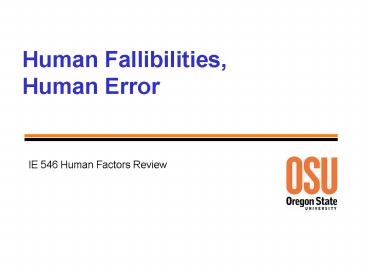Human Fallibilities, Human Error - PowerPoint PPT Presentation
1 / 12
Title:
Human Fallibilities, Human Error
Description:
capable of erring, tending or likely to err (American Heritage) ... and confirmation; and although most cogent and abundant instances may exist to ... – PowerPoint PPT presentation
Number of Views:75
Avg rating:3.0/5.0
Title: Human Fallibilities, Human Error
1
Human Fallibilities,Human Error
- IE 546 Human Factors Review
2
Lessons Learned from Aviation and Medicine
- Causes of Adverse Events
- Rarely
- individual incompetence
- lack of due diligence
- bad luck
- Commonly
- Vulnerable Systems
- vulnerable susceptible to injury, unprotected
from danger (American Heritage) - Fallible Humans
- capable of erring, tending or likely to err
(American Heritage) - from E.L. Wiener, Fallible Humans and
Vulnerable Systems Lessons Learned from
Aviation, 1987
3
Human Fallibility System Vulnerability ? Human
Error
- Human Error
- an occasion in which a planned sequence of
mental or physical activities fails to achieve
its intended outcome, and when these failures
cannot be attributed to the intervention of some
chance agency. - James Reason, Human Error
- Broad Classes of Human Errors
- Planning Failures Mistakes
- inappropriate plan, misdirected intention
- plan carried out as intended
- e.g., wrong medication prescribed administered
- Execution Failures
- Slips
- appropriate plan, intention
- part of plan performed incorrectly
- e.g., trocar injury
- Lapses
- appropriate plan, intention
- part of plan omitted
- e.g., forget to remove sponge before closing
4
Understanding Human Error The Stage (AORTA)
Model of Human Performance
Attend
attend to one task attend to several tasks
Remember
Observe
Think
Act
see/read hear feel (palpate) detect discriminate r
ecognize perceive
memorize recall (long-/short-term) maintain
mental model
calculate decide solve develop alternatives choose
alternative select response
reach grasp move/manipulate speak walk/run respond
responses
stimuli
Environment
5
Attend
- attend to one info channel/task
- attend to wrong task
- attraction to salient but irrelevant cues
- limited ability to judge task importance, status,
urgency - excessive sampling
- attend to multiple info channels/tasks
- fail to attend to channel/task
- limited working memory (forget task)
- insufficient mental resources
- lag in modality switch
- stress-induced narrowing of attention
- perform concurrent task inadequately
- cost of concurrence
- insufficient mental resources
6
Observe
- detect (visual/auditory/tactile)
- fail to detect (miss)
- thresholds of detectability (e.g., visual angle)
- other sensory limits (e.g., visual field)
- sensory impairments (e.g., presbyopia)
- auditory masking
- vigilance loss
- susceptibility to fatigue
- discriminate/distinguish (visual/auditory/tactile)
- fail to discriminate
- thresholds of discriminability
- identify/recognize/perceive (visual/auditory/tacti
le) - fail to identify/recognize
- WM limits (gt 5 choices, absolute discrimination)
7
Remember
- recall
- fail to recall (short term)
- limited working memory capacity (7 2 chunks)
- limited working memory duration (lt 20 sec)
- verbal/spatial dominance (favored coding)
- inefficient chunking
- fail to recall (long term)
- weak associations
- inefficient chunking
- maintain mental model
- erroneous mental model
- WM limits
- processing limits (see Think)
8
Think
- identify/define problem
- improperly define problem
- see below
- generate hypotheses/alternatives
- fail to generate appropriate hypothesis
- see below
- evaluate/compare hypotheses/alternatives
- erroneous evaluation/comparison
- anchoring
- confirmation bias
- recency bias
- tendency to ignore info sources
- tendency to treat all sources as equally reliable
- bias against absence of cues
- erroneous causal inferences
- asymmetric valuation (gain/loss)
- overconfidence
- erroneous mental model
- difficulty specifying values/costs
9
Anchoring, Confirmation Bias
- ... The human understanding, when any proposition
has been once laid down (either from general
admission and belief, or from the pleasure it
affords), forces everything else to add fresh
support and confirmation and although most
cogent and abundant instances may exist to the
contrary, yet either does not observe or despises
them, or gets rid of and rejects them by some
distinction, with violent and injurious
prejudice, rather than sacrifice the authority of
its first conclusions. ... - Francis Bacon
- Novum Organum, 1620
10
Act
- respond
- respond too slowly (general)
- response time proportional to
- stimulus uncertainty (Hick-Hyman Law)
- response time inversely proportional to
- stimulus intensity
- stimulus discriminability
- speed/accuracy tradeoff
- reach
- miss target
- visual constraints
- anthropometric constraints (e.g., short arms)
- neuromuscular constraints
- speed/accuracy tradeoff (Fitts Law)
- grasp
- allow object to slip
- strength limits
- hand/object interaction deficiencies
- move/manipulate
11
Rasmussen / Reason Model of Human Performance
Skill-Based
Rule-Based
Knowledge-Based
goal / problem recognized
consider state info
try to find analogy
yes
found ?
familiar pattern ?
no
initiate automatic process with attentional
checks
no
revert to mental model, analyze
yes
apply If-Then rule
deduce, infer, plan, execute
problem resolved ?
problem resolved ?
problem resolved ?
no
no
no
yes
yes
yes
goal achieved
12
Reasons Error Taxonomy (partial)
- Skill-Based Errors
- double-capture slips
- omissions (lapses) following interruption
- reduced intentionality (prospective memory
errors) - Rule-Based Errors
- first exceptions
- strong-but-wrong rules
- information overload
- wrong rule
- Knowledge-Based Errors
- selectivity
- working memory limitations
- anchoring / confirmation bias
- illusory correlation
- problems with complexity
- delayed feedback
- serial vs. network causality
- thematic vagabonding






























